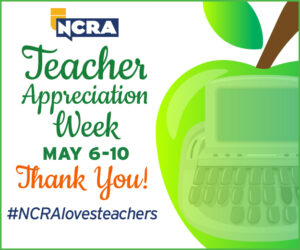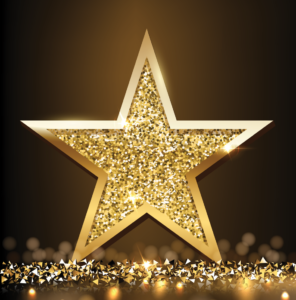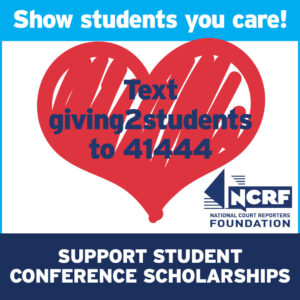
In honor of National Punctuation Day, which was on Sept. 24, the JCR hosted a discussion with NCRA’s Proofreading Advisory Council about punctuation marks. Members talked about whether they use the Oxford/serial comma or not, what they call #, what punctuation rules they look up the most, and what their favorite punctuation mark is. The following members shared their responses:
- Aimee Suhie, RPR, a freelancer in New Fairfield, Conn.
- Judy Lehman, FAPR, RMR, CRI, an official in Shelbyville, Ill.
- Janine Ferren, RPR, CRR, a freelancer in Fishers, Ind.
- Patricia Miller, CRI, CPE, an instructor in Middletown, Del.
- Francesca Ivy, RPR, a freelancer in Metairie, La.
- Kathy McHugh, RPR, CRR, a freelancer in Audubon, N.J.
- Do you use the Oxford/serial comma? Why or why not?
Aimee Suhie: I’m sorry to say I despise the Oxford comma and have never used it. I figure if you have an and or an or in the sentence, why do you need a comma before it? If you have a list like book, pencil, desk — bingo, commas! But if you have book, pencil and desk, isn’t that why the and is there? I know even the New York Times uses the Oxford comma, but when I was a newspaper reporter, I never did.
Judy Lehman: I do use the Oxford/serial comma. Although it takes a little more time — and I don’t love it — it clarifies things that may otherwise be ambiguous. Good example found here.
Janine Ferren: Yes, I do use the Oxford comma. [Ed note: Janine referenced the slightly risqué Web comic that involves JFK, Stalin, and two dancing girls that is frequently cited in editing, proofing, and grammar circles.]
Patricia Miller: I do use the Oxford/serial comma. I like to be precise and for sentences to be as clear as possible. If a situation warrants leaving it out, I will do that. Flexibility in punctuation is important in order for the message to say what it intends to say.
I do not understand the intensity of feeling that some have regarding any individual mark of punctuation (nor the dogmatic application, or not, of any one rule or style). It’s a living language, people! We are professionally alive and vital because we can adapt better than the other methods. They all, the marks, exist as tools to help the reader see the words and the message as smoothly as possible. They can be used creatively to misdirect the reader (not in our profession, of course) and can be piled in to make words as precise as math.
Francesca Ivy: I use the Oxford/serial comma. Always have and always will. It is what I learned to do, and I agree that it prevents sentences from being misunderstood.
Kathy McHugh: I don’t always use the Oxford comma — it seemed unnecessary a lot of the times — but I think you ladies have convinced me it serves a purpose.
- What is # called?
AS: To show my age, # means number to me, not hashtag!
JL: Yeah, it’s the number symbol for me, too. Hashtag means what, anyway?
JF: I always used to call it the number sign. Then people started calling it pound, such as on the telephone. At first I didn’t know what it was. I figured out that it was the number sign by process of elimination, because it definitely wasn’t the star! Then hashtag started with the social media platforms. I use all three terms now, depending on what I’m referring to.
PM: I use the word that fits the usage. So hashtag if social media. Pound sign or number sign if communication, such as a telephone number. Pound as a measurement.
FI: If I see it standing alone like above, I call it the number sign. If it is connected with social media, I say hashtag.
KM: I would automatically call # the pound sign, but I understand its other meanings.
- Which punctuation rule do you double check the most?
AS: I memorized Lillian Morson’s amazing punctuation rules for commas and semicolons in sentences and faithfully followed her rules of “comma, comma, semicolon” and never more than two commas. In recent years, however, I definitely strayed from that rule and used separate sentences more instead of semicolons to allow the attorney who might be reading this aloud to a jury to be more clear on where each sentence was going. I didn’t check the rules because I was so impressed by every word she wrote (and spoke at conventions — I even got to meet her!) that I absorbed them and thought each made perfect sense. I did and do have to check Mary Louise Gilman’s One Word, Two Words, Hyphenated?, however, several times per transcript.
JL: Probably hyphenations and one word/two words are what I check most. I have several copies of Mary Louise Gilman’s One Word, Two Words, Hyphenated? around. It’s an oldie but a goodie. While grading fast-fingered reporter speed tests this past weekend, we had several of those issues arise — housecleaning or house cleaning, for instance.
JF: What punctuation rule do I check the most? Numbers and hyphens.
PM: That’s tricky. It’s not the rule so much as the application in a particular situation. I investigate hyphens the most.
FI: I would probably say quotation rules, especially in the Q&A form when parts of another transcript are read into the record I’m taking. It doesn’t happen too often in depositions.
KM: I check the need to hyphenate words the most.
- What is your favorite punctuation mark?
AS: Love the dash! Makes sentences so clear to the attorney reading them.
JL: My fave punctuation mark for transcripts is the reporter dash. That may be obvious from my first two answers. It’s awesome for enhancing readability, which is what transcripts are all about. For other writing I do, likely my favorite is the much maligned and underutilized semicolon! I’ve taught English classes for court reporters, medical transcription students, and accounting students, and I currently teach some professional development classes in adult education. I harp on the correct usage of this jewel.
JF: My favorite! Punctuation! Mark! Is one I never use in a transcript! Can you guess what it is?! I’m Italian, I speak with my hands, and so I use the exclamation point like I use my hands.
PM: I like getting to the end of a long sentence without needing any internal punctuation. I do not have a favorite mark. All the kids get to play on my team.
FI: I would have to go with the exclamation point, probably because I don’t get to use it in transcripts!!!
KM: I guess the exclamation point would be my favorite as well but, yes, never used in a transcript.












